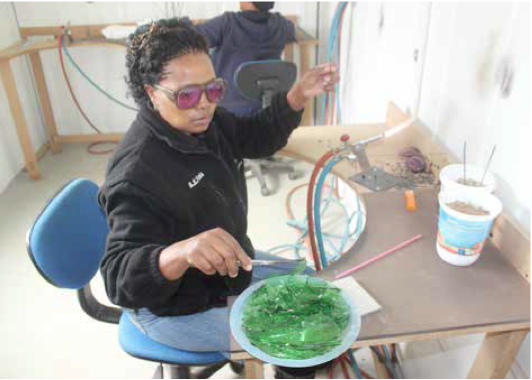Trash to treasure: making jewellery from recycled bottles
Trash to treasure: making jewellery from recycled bottles sadminSeven women from KwaNyuswa in Durban, KwaZulu-Natal, are turning beer and cool drink bottles into jewellery, making good money in the process.
 The group call themselves the Simunye Hand Craft and Jewellery makers.
The group call themselves the Simunye Hand Craft and Jewellery makers.
Simunye makes earrings, bracelets, and necklaces along with serving trays,
salad spoons, forks, bookmarks and corkscrews decorated with melted glass. Some of the items are sold as corporate gifts. Simunye has also signed an agreement with businesswoman Khanyi Dhlomo Mkhize to supply goods to her upmarket boutique.
After struggling to find employment, members of the group came together in 2004 and started making traditional beadwork. Soon thereafter, they asked the eThekwini Municipality to help them with training as they wanted to grow the business.
“When the municipality came on board in 2010, they introduced us to the process of manufacturing glass beads,” recalls chairperson of the cooperative, Angel Hlongwane.
She adds that for 12 months the municipality helped them with procuring equipment and contracted a company called Mintek to provide training and mentorship for the group.
The group also received a R500 000 grant from the KwaZulu-Natal Department of Arts and Culture which helped boost the business further.
The women work from a container where they store the bottles and gas used to melt the glass and make the goods.
A typical day at Simunye starts with collecting green, brown and transparent glass bottles around the community.
“We clean the material then break it into little pieces and melt it using a torch infiltrated with gas. Once this is done we form different de- signs depending on the customer’s preference. “The glass is cooled in a blanket for about three hours before it is cleaned with water and turned into jewellery.”
The cooperative has exhibited its work at expos in the country and around the world.
Hlongwane says they have attended expos such as the Durban Business Fair, Sustainable Living Expo, Jewelex as well as expos in China and America with the assistance of the Department of Trade and Industry (dti).
“It's great that the dti also assists us in marketing our business. Even if nobody buys our goods when travelling but they always call us back to place orders. It’s very good marketing.”
MEC of Tourism and Economic Development in KwaZulu-Natal Mike Mabuyakhulu has said the province aims to become the powerhouse of arts, craft and tourism in the country and in the region.
Speaking at the KwaZulu-Natal Arts and Craft Conference in December last year, MEC Mabuyakhulu said the craft sector is as old as the cultures of the people from which it originates hence it’s often referred to as the cultural industry.
“The sector has become a serious contributor to the global economy hence arts and craft can no longer be treated like a hobby for artists and crafters to pass time and satisfy their desires or express their feelings about life as they see it around them.”He said the arts and crafts were becoming big business that was contributing to Gross Domestic Product (GDP) of different countries around the world.
MEC Mabuyakhulu said this called for serious investment to the industry.
“In Morocco, the craft industry contributes 15% of GDP while in South Africa we are languishing at 0.14% that translates to only R32 billion and is a source of income for 273 495 people employed in 31 802 small businesses.” Hlongwane would like to pass on her unique combination of recycling and craftsmanship. “Moving forward we would like to teach our community about the importance of recycling and teach young people this skill that we have.”